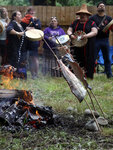

TOLEDO — Voices rose in unison with drum song as a fragrant fire hissed and glowed Sunday morning at the point where Olequa Creek and the Cowlitz River come together.
Members of the Cowlitz Tribe and their friends stood on the banks of the river, waiting to sing and celebrate the arrival of the salmon in an ancient ceremony that marks an important time in the year of the tribe.
The ceremony of the first salmon involves thanking the salmon for its journey to bring tribal members food.
The people waited for the arrival of a canoe which carried a salmon, caught earlier in the day by a tribal fisherman. The people waited to celebrate and remember a time when the salmon brought them life.
Alvie Bouchard very much remembers the early days here on these same grounds, where the people came to celebrate.
“This was my father’s traditional fishing grounds,” he said, his eyes sweeping a glance at the river, as he remembered.
“He fished with a net, it was 50 feet long. He would tie it to the roots of the trees on the other side, and wait for the net to fill up.”
Alvie’s father would fish for sustenance for his family, as well as his livelihood, selling the fish to buy what he could not make or catch.
Tanna Engdahl, Bouchard’s cousin, remembers those days well.
“He would row us out to the sandbar in the river and start a big fire,” she said. It was very early in the morning when the children would be gathered on the sandbar to wait while elders fished. “They would wrap us in blankets.”
“I was a wild little Indian back then,” Bouchard chuckled. “He would tie me to the tree so I wouldn’t get too close to the water and fall in.”
Bouchard spoke to the assembled people, in the traditional way to welcome all, including visiting peoples from other tribes.
“My father always said when the dogwoods were in bloom, the spring salmon were coming,” Bouchard said. “When you would see swallows dipping down into the river, the swallows were leading the salmon up.”
Down to the edge of the river, the people walked. The drums, warmed by the fire, were played as the young girls danced in the sand.
Soon, a young boy shouted “Canoe!” and the distant voices of the approaching singers in the canoe were heard.
As the carved canoe was pulled onto shore, the salmon was reverently placed on the cedar mat and carried up the hill, to the fire. The salmon handlers worked, slicing the salmon and salting it, placing the salmon on sticks which were then leaned over the fire to cook. After the salmon was done, young girls served the elders and visitors pieces of the salmon, eaten reverently, in remembrance and thankfulness.
“In the old days, the salmon were like bread to our people,” Roy Wilson, spiritual leader of the Cowlitz people, spoke to those assembled. “It is important for our people to show honor to the salmon people. We (have placed) the salmon on a new cedar mat, its head positioned in the direction from which it came, a fruit placed in its mouth. It is proper to thank the salmon for giving its life, so that we might have life. May we always show honor for all life. For we are all related. We are related to all the two-legged, the four-legged; all the crawlers and the flyers and the dream people. The one thing we all have in common is, we all come from the Earth Mother. And to the Earth Mother we shall return.”